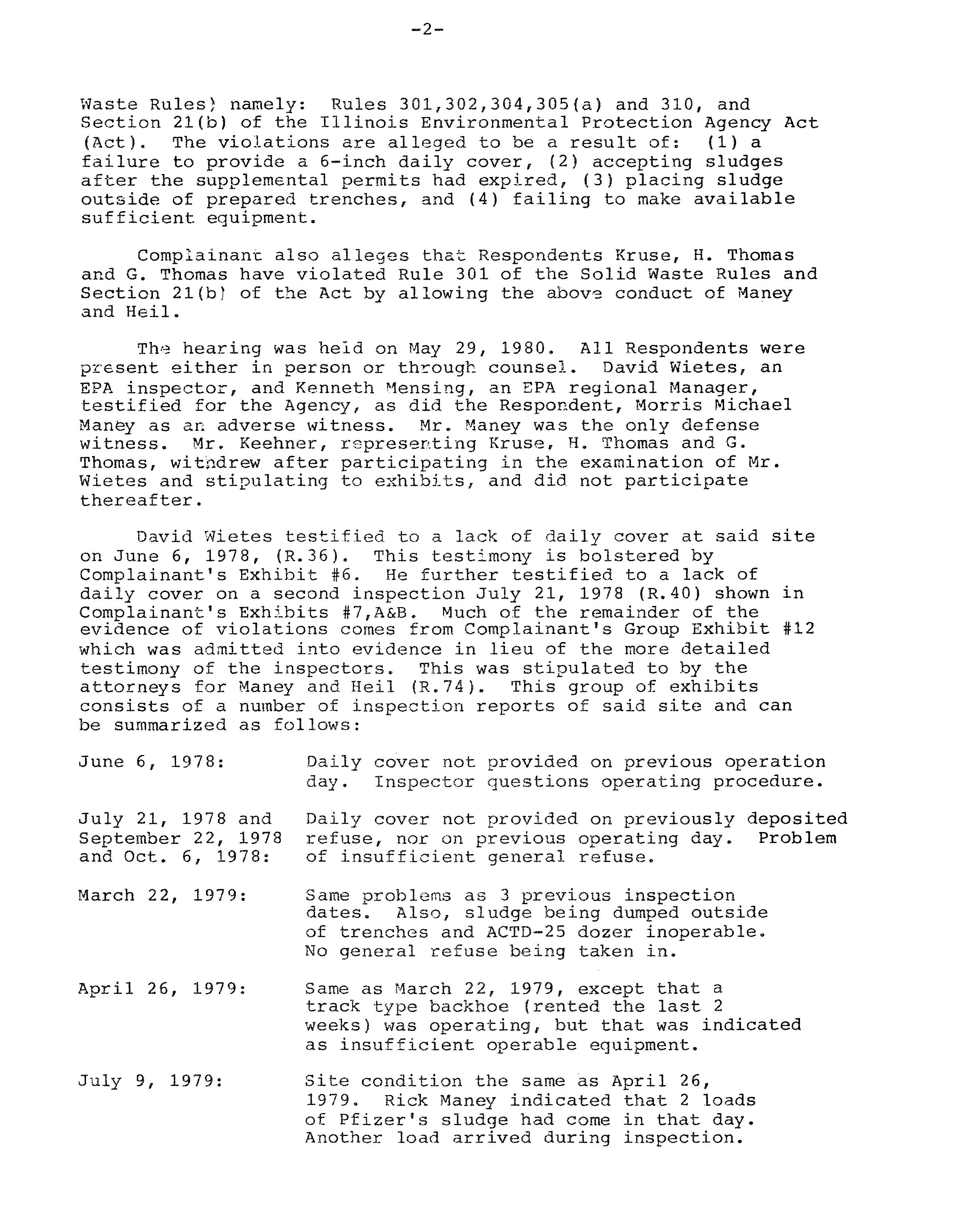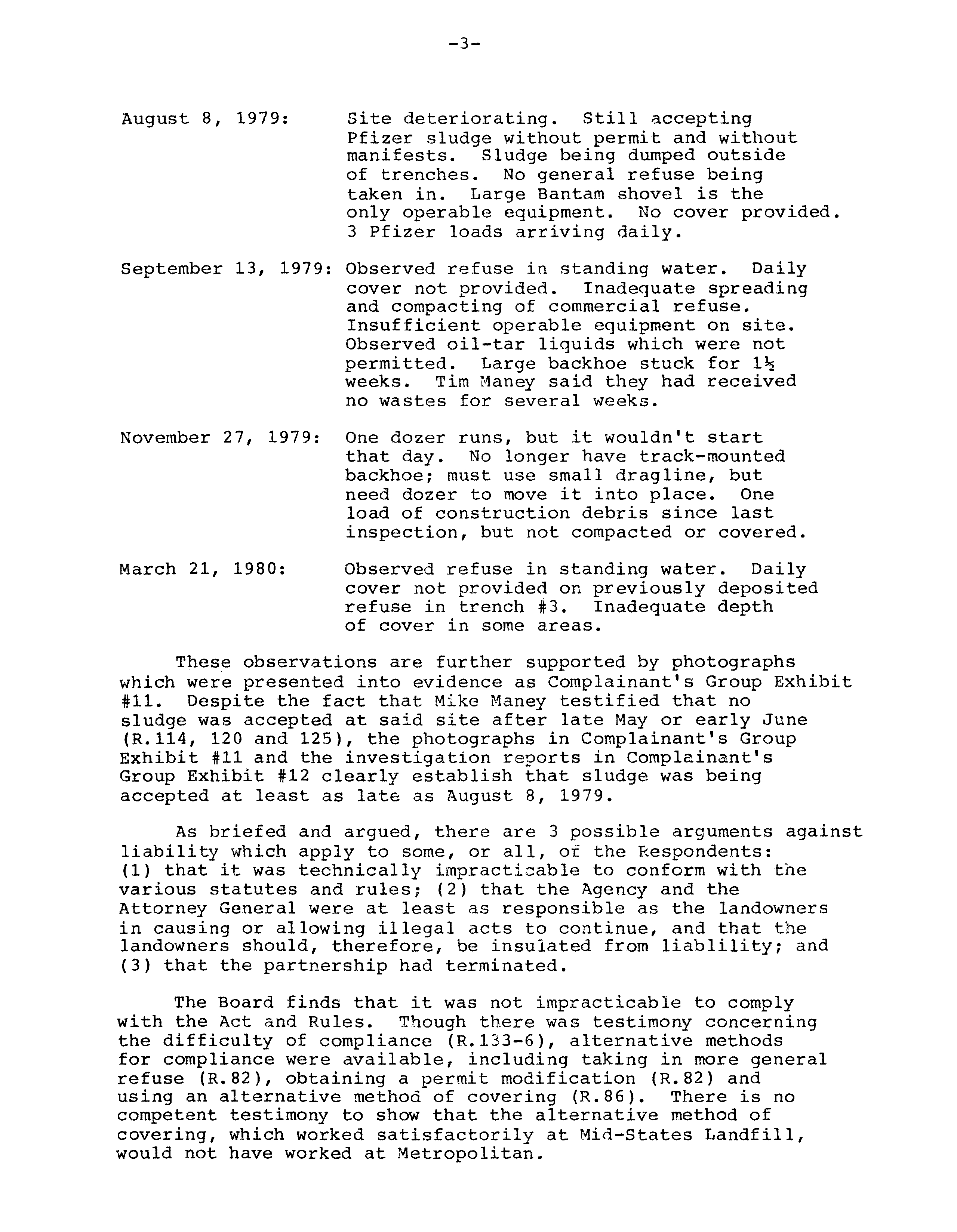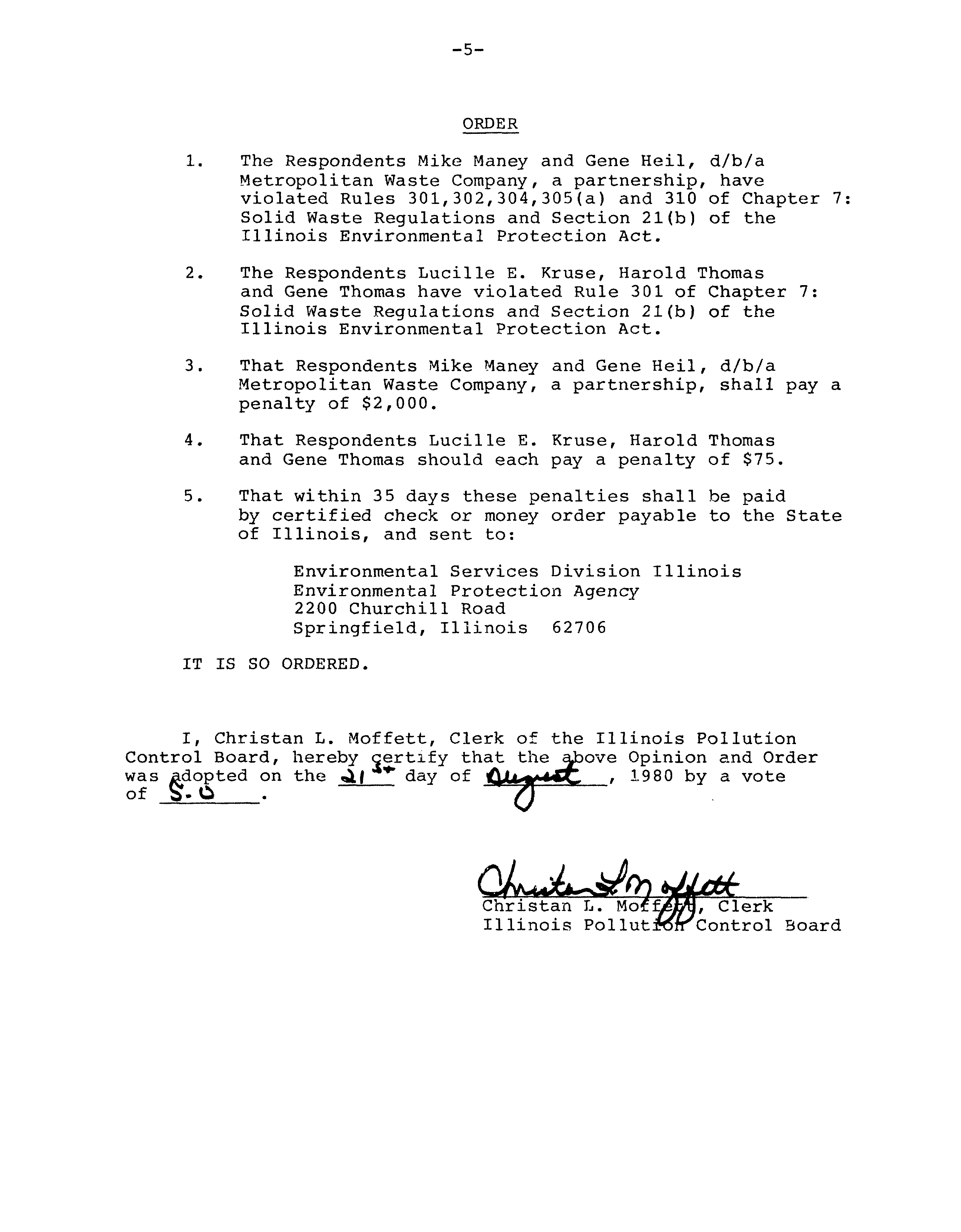| | - EPA inspector, and Kenneth Mensing, an EPA regional Manager,
- testified for the Agency, as did the Respondent, Morris Michael
- Maney as an adverse witness. Mr. Maney was the only defense
- witness. Mr. Keehner, representing ICruse, N. Thomas and G.
- Thomas, withdrew after participating in the examination of Mr.
- June 6, 1978:
- July 21, 1978 andSeptember 22, 1978and Oct. 6, 1978:
- March 22, 1979:
- April 26, 1979:
|
ILLINOIS POLLUTION CONTROL BOARD
August 21, 1980
ILLINOIS ENVIRONMENTAL PROTECTION
AGENCY,
Complainant,
v.
)
PCB 79—262
MIKE MANEY AND GENE HElL,
d/b/a
)
METROPOLITAN WASTE COMPANY, a
PARTNERSHIP;
and LUCILLE
E.
KRtJSE,
)
HAROLD
THOMAS
and
GENE
THOMAS,
Respondents.
MR.
REED
~J.
NEUMAN
AND
MS.
CHRISTINE
G.
ZEMAN,
ASSISTANT
ATTORNEYS
GENERAL, APPEARED ON BEHALF OF THE COMPLAINANT.
MR. CHARLES E. HAMILTON APPEARED
ON
BEHALF
OF THE RESPONDENT MIKE
MANEY; MR. DALE M. FUNK APPEARED ON BEHALF OF THE RESPONDENT GENE
HElL; AND MR. JIM D.
KEEHNER APPEARED ON BEHALF OF THE
RESPONDENTS LUCILLE KRUSE, HAROLD THOMAS, AND GENE THOMAS.
OPINION AND ORDER OF THE BOARD
(by J.D. Dumelle):
This matter comes before the Board upon an amended complaint
filed February 27,
1980,
by the Illinois Environmental Protection
Agency (Agency).
The amended complaint alleges that Respondents,
Mike Maney
(Maney) and Gene Heil
(Heil),
are general partners
doing business as Metropolitan Waste Company
~Metropolitan)
and
have operated a sanitary landfill and solid waste disposal site
(said site)
in Belleville,
St. Clair County,
Illinois.
At all
times relevant to this complaint Metropolitan leased the property
constituting said site from the owners,
Respondents Lucille
E.
Kruse, Harold Thomas,
and Gene Thomas
(Kruse,
H.
Thomas,
and G.
Thomas). Operational permits were issued on March 10,
1978,
to
all Respondents, Maney
and Heil
(as operators of Metropolitan)
and Kruse,
H. Thomas,
and G.
Thomas
(as landowners),
authorizing
them to handle general municipal solid waste on said site.
Supplemental permits were issued to Respondent Maney,
on April
25,
1978, permitting Metropolitan to accept heavy metal sludge at
said site until the expiration date of April
25,
1979.
Complainant alleges that on various dates between June
6,
1978,
and February
22,
1980, Respondents Maney and Heil violated
various rules of Part III of the Illinois Pollution Control
Board Rules and Regulations, Chapter
7:
Solid Waste
(Solid
—2—
Waste Rules)
namely:
Rules
301,302,304,305(a)
and
310,
and
Section 21(b) of the Illinois Environmental Protection Agency Act
(Act).
The violations are alleged to be a result of:
(1) a
failure to provide a 6—inch daily cover,
(2) accepting sludges
after the supplemental permits had expired,
(3) placing sludge
outside of prepared trenches, and
(4) failing to make available
sufficient equipment.
Complainant also alleges that Respondents
Kruse,
N.
Thomas
and
G. Thomas have violated Rule 301 of the Solid Waste Rules and
Section
21(b)
of
the
Act
by
allowing
the
above
conduct
of
Maney
and Neil.
The hearing was held on May 29, 1980.
All Respondents were
present either in person or through counsel
•
David Wietes, an
EPA inspector, and Kenneth Mensing, an EPA regional Manager,
testified for the Agency,
as did the Respondent, Morris Michael
Maney as an adverse witness.
Mr. Maney was the only defense
witness.
Mr. Keehner, representing ICruse, N. Thomas and G.
Thomas, withdrew after participating in the examination of Mr.
Wietes
and
stipulating
to
exhibits,
and
did
not
participate
thereafter.
David Wietes testified to a lack of daily cover at said site
on
June
6,
1978,
(R.36).
This testimony is bolstered by
Complainant’s Exhibit *6.
Ne further testified to a lack of
daily cover on a second inspection July 21, 1978
(R.40) shown in
Complainant’s Exhibits *7,A&B.
Much of the remainder of the
evidence of violations comes from Complainant’s Group Exhibit *12
which was admitted into evidence in lieu of the more detailed
testimony of the inspectors.
This was stipulated to by the
attorneys for Maney and Neil
(R.74).
This group of exhibits
consists of a number of inspection reports of said site
and can
be summarized as follows:
June 6, 1978:
July 21, 1978 and
September 22, 1978
and Oct.
6, 1978:
March 22,
1979:
April 26,
1979:
July
9,
1979:
Daily cãer not provided on previous operation
day.
Inspector questions operating procedure.
Daily cover not provided on previously deposited
refuse, nor on previous operating day.
Problem
of insufficient general refuse.
Same problems as 3 previous inspection
dates.
Also, sludge being dumped outside
of trenches
and
ACTD—25 dozer inoperable.
No general refuse being taken in.
Same
as March 22, 1979, except that a
track
type
backhoe
(rented
the
last
2
weeks) was operating, but that was indicated
as insufficient operable equipment.
Site condition the same as April 26,
1979.
Rick Mane!1r indicated that
2 loads
of Pfizer’s sludge
had
come in that day.
Another load arrived during inspection.
—3—
August
8,
1979:
September 13,
1979:
November
27,
1979:
March
21,
1980:
Site deteriorating.
Still accepting
Pfizer sludge without permit and without
manifests.
Sludge being dumped outside
of trenches.
No general refuse being
taken in.
Large Bantam shovel is the
only operable equipment.
No cover provided.
3
Pfizer
loads
arriving
daily.
Observed
refuse
in
standing water.
Daily
cover
not
provided.
Inadequate
spreading
and compacting
of commercial refuse.
Insufficient operable equipment on site.
Observed oil-tar liquids which were not
permitted.
Large
backhoe
stuck
for
1½
weeks.
Tim Maney said they had received
no wastes for several weeks.
One dozer runs, but it wouldn’t start
that
day.
No
longer
have
track—mounted
backhoe; must use small dragline, but
need dozer to move it into place.
One
load of construction debris since
last
inspection, but not compacted or covered.
Observed refuse
in standing water.
Daily
cover not provided on previously deposited
refuse in trench #3.
Inadequate depth
of cover
in some areas.
These observations are further supported by photographs
which were presented into evidence as Complainant’s Group Exhibit
#11.
Despite the fact that Mike Maney testified that no
sludge was accepted at said site after
late May or early June
(R.114,
120 and 125),
the photographs in Complainant’s Group
Exhibit #11 and the investigation reports in Complainant’s
Group Exhibit #12 clearly establish that sludge was being
accepted at least as late as August
8,
1979.
As briefed and argued, there are
3 possible arguments against
liability which apply to some, or all,
of the Respondents:
(1)
that it was technically impracticable to conform with the
various statutes and rules;
(2) that the Agency and the
Attorney General were at least as responsible as the
landowners
in causing or allowing illegal acts to continue, and that the
landowners should, therefore,
be insulated from liablility;
and
(3) that the partnership had terminated.
The Board finds that it was not impracticable to comply
with the Act and Rules.
Though there was testimony concerning
the difficulty of compliance
(R.133—6),
alternative methods
for compliance were available,
including taking in more general
refuse
(R.82),
obtaining a permit modification
(R.82) and
using an alternative method of covering
(R.86).
There is no
competent testimony to show that the alternative method of
covering, which worked satisfactorily at Mid—States Landfill,
would not have worked at Metropolitan.
—4—
The second argument goes solely to the liability of the
landowners; Eruse, H. Thomas, and G. Thomas.
The
argument
is
that
since
the
Agency
and
the
Attorney
General
were
at
least
as
responsible
as
the
landowners
for
allowing
or
causing
illegal
acts
to continue on said site, that the landowners should not be
held
liable.
Respondents
have
cited
no
authority
that
imposes
a
duty
upon
the
Agency
or
the
Attorney
General
to
utilize
their
powers
in
cases
such
as
this,
and
the
Board,
therefore,
does
not
find
this
to be
a
defense.
The third,
and
final,
argument goes solely to the liability
of Bell.
The existence or non—existence of a partnership between
Haney and Heil is touched upon several times in the course of the
hearing, and
much
of the testimony points toward the non—existence
of
it (esp. R166-189).
The
record gives no indication
that
Hell
personally
participated
in
the
management
of
the
landfill,
or
even
that
he
was
aware
of
any
irregularities
in
its
operation
prior to the filing of the compliant.
However, neil admitted his
partnership involvement before the hearing (R.26) and failed to
object
to its inclusion in the record (R.29).
Therefore, the
Board finds that all evidence regarding the existence of the
partnership is immaterial and will not be considered and
that a
partnership
did
exist.
The Board notes that certain of the specific dates of
alleged violations do not appear to conform to the dates for
which investigation reports were entered into evidence.
However,
the Board finds that given the ongoing nature of
those
violations
and the failure to rebut violations on those dates, that each of
the alleged violations did
occur
on each of the dates
and
during
each of
the
periods
of
time
alleged.
The
Board
finds
further
that
the
evidence
as
a
whole
supports
the
view
that
al 1
Respondents
made
minimal
efforts
to
come
into
compliance
with
Board
Rules
and
the
Act
until
the
filing of the complaint, and that the laudatory efforts made
since the filing have come
too
late.
The regulatory scheme for
protecting the environment
can
only be truly effective if
compliance is maintained throughout the period of operation.
After
the
fact
compliance
does
little
to
remedy
the
inconveniences
that
affect
citizens
in
the
area
such
as
Mrs.
Virginia H. Smith who wrote to the Board to complain of the
conditions she had to endure.
For that reason, the Board finds
that
a
civil
penalty
is
required
to
aid
enforcement
of
the
Act
and
the
Board’s
Solid
Waste
Regulations
promulgated
pursuant
thereto.
The
Board
has
considered
the
factors
contained
in
S33(c)
of
the
Act in determining a reasonable penalty, including,
but not limited to, the aggravating factor of the mishandling of
wastea
containing heavy metals.
The Board finds
that a penalty
of $2,000 with respect to Metropolitan, and of $75 each with
respect to L.
Kruse, H. Thomas, and G. Thomas is one which will
protect the vitality of the
Act
and
the
Board’s
regulations.
This
Opinion
constitutes
the
Board’s
findings
of
fact
and
conclusions
of
law
in
this
matter.
—5—
ORDER
1.
The Respondents Mike Maney and Gene Heil,
dibla
Metropolitan Waste Company, a partnership, have
violated Rules 301,302,304,305(a) and 310 of Chapter
7:
Solid Waste Regulations and Section 21(b) of the
Illinois Environmental Protection Act.
2.
The Respondents Lucille E.
Kruse,
Harold Thomas
and Gene Thomas have violated Rule 301 of Chapter
7:
Solid Waste Regulations and Section 21(b) of the
Illinois Environmental Protection Act.
3.
That Respondents Mike Maney and Gene Heil, d/b/a
Metropolitan Waste Company,
a partnership,
shall pay
a
penalty of $2,000.
4.
That Respondents Lucille E.
Kruse,
Harold Thomas
and Gene Thomas should each pay a penalty of $75.
5.
That within 35 days these penalties shall be paid
by certified check or money order payable to the State
of Illinois,
and sent
to:
Environmental Services Division Illinois
Environmental Protection Agency
2200 Churchill Road
Springfield, Illinois
62706
IT
IS
SO
ORDERED.
I, Christan L. Moffett,
Clerk of the Illinois Pollution
Control Board, hereby ~ertify that the
ove Opinion and Order
was ~dopted on the
~(
~ day of
___________,
1980 by
a vote
Christan L. Mo
,
Clerk
Illinois Pollut
Control Board





